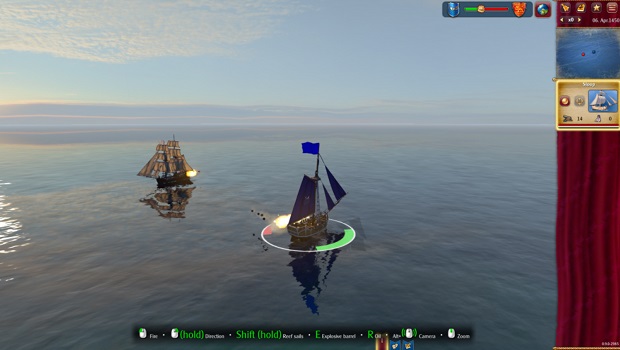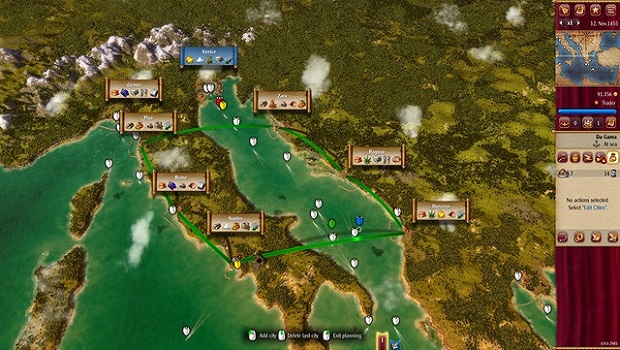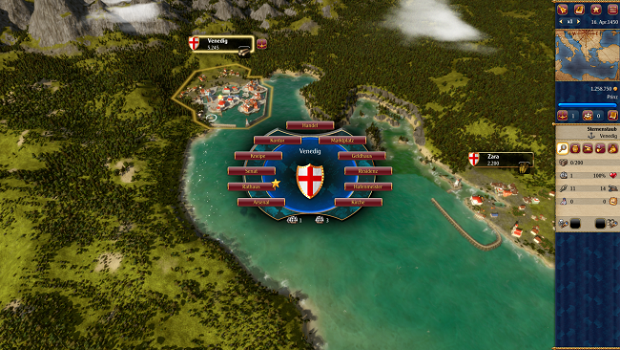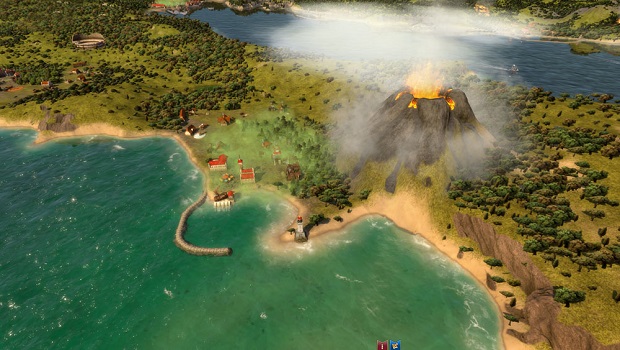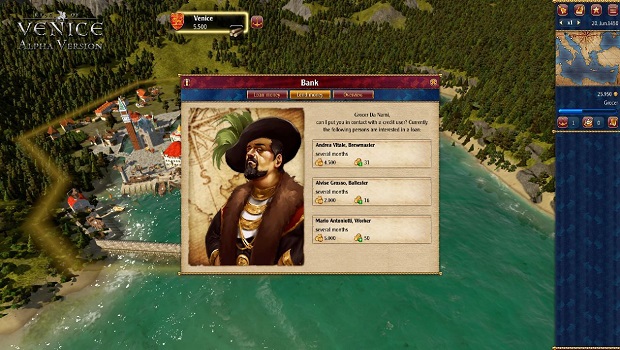Kalypso has finally taken their series of trading simulations to Renaissance Italy in Rise of Venice. A sequel of sorts to last year’s Port Royale 3, the game includes a wealth of improvements that provide a more engrossing experience, though the game is ultimately held back from true greatness by its interface and weak combat.
The Rise of Venice campaign puts the player in the shoes of a young lord from a minor family just breaking into the trading business. You’ll start with one ship, taking it from port to port, buying goods at low prices and selling them where they are more valued. Quickly, I found myself absorbed once again into manipulating the game’s economy. Supply and demand are in full force here, as selling an item in too great a quantity in a given city will dramatically affect the price you get back (and not for the good). It’s a well-done system, and the one that is the core around which the game is built.
As I amassed wealth, I leveled up both my character and my captains. My trading fleet, as it grew from one vessel to nine, was organized into three convoys, each led by a captain. The game allows you to automate the trading routes of the convoys, allowing you to establish corridors of guaranteed wealth. Over time, captains gain experience, allowing them to upgrade speed, combat ability, trading skill and so forth. And as they generate wealth and you purchase ships, you yourself will rise in level.
The player leveling mechanic is the one aspect of Rise of Venice that feels forced. Port Royale 3 did have levels, but here they seem to have more of an effect. Your level determines where you can buy trading licenses and building permits, and oddly, what goods you’re allowed to purchase. Why for the life of me am I forbidden from buying cotton from Egypt because I’m not the right level even though I have plenty of money? Building licenses makes some sense (as reputation could have some influence over your ability to purchase property), but it doesn’t really make sense for it to affect the goods themselves. You become eligible to level up when you have the requisite amount of wealth and ships. And this point you present yourself to the Council of Venice for a vote. The council seems to exist only for this purpose- an addition to the leveling up mechanic. You can manipulate them to like you and force them to vote with you, but this is as close as you get to Republican intrigue. It’s a little thin and could use some serious fleshing out. Still, it’s nice to have some sort of payoff for generating lots of money.
And what did I do with all this wealth I amassed? I, of course, built structures to generate more wealth. You can build and purchase building in cities to create your own goods. Some of the goods produced (the most profitable ones) require raw materials to be produced. A good trading route can move raw materials produced in one city to another where they are made into a good and then sell those in a third city where the price is highest. This is how you make your money. It takes time to build up those sorts of production lines, but when you finally get there, it is immensely satisfying. The game does lack a way of effectively tracking everything from a strategic point of view, however. I could use access to a ledger of my entire trading empire at once. Everything seems to be hidden away. Since I spend most of the game staring at a broad strategic map, it would be nice to have that sort of information a click away. Still, trading is fun, and once you begin to expand and get trade routes in place, the game is quite entertaining.
Of course, you could simply ignore the trading and focus on the combat (though, you’ll need money for ships, men, weapons and ammo, so ignoring the trading might leave you a little short on cash). The combat, I find, is a less satisfying experience. It’s built for a controller, and even then it feels awkward. Like Port Royale 3, you only control one of your ships at a time, sailing around, loosing broadsides on your foes. It’s rather arcade-like and not particularly deep. I tended to bypass combat in favor of auto-resolve, which if you’ve seen me play Total War games, is the opposite of my normal approach. Thankfully, the combat is not a premiere feature, but only a sideshow to the main act.
Rise of Venice is a step in the right direction. It really has its trade model down. Improvements to the combat and political models, however, would be needed to really take this game to the next level. As it is, those features pale in comparison to the game’s core, providing temporary distractions from the point of the game: buying and selling goods to make a lot of money. I loved taking convoys from port to port and stacking up the cash. Fans of combat and politics should still stay elsewhere.
